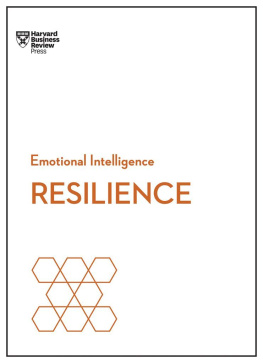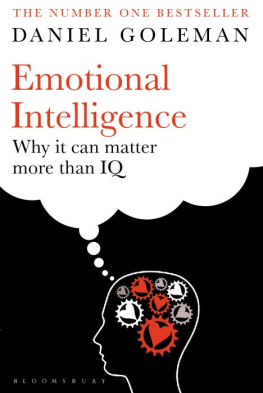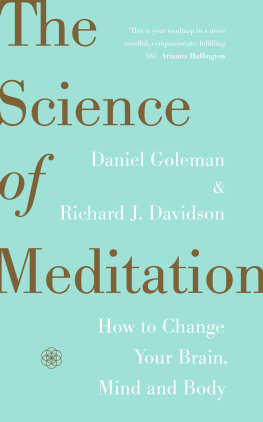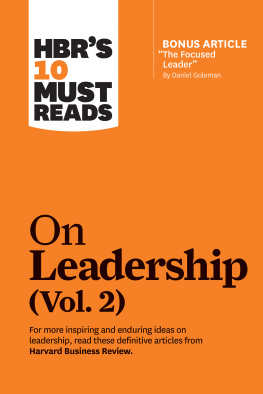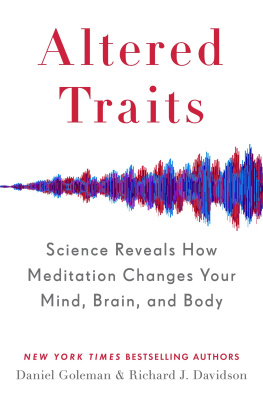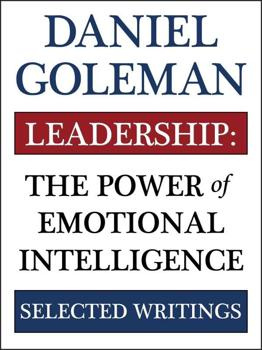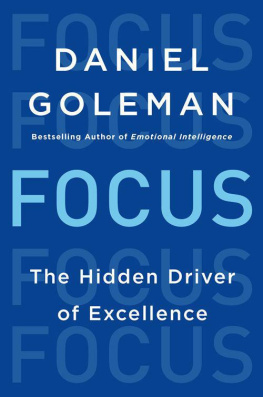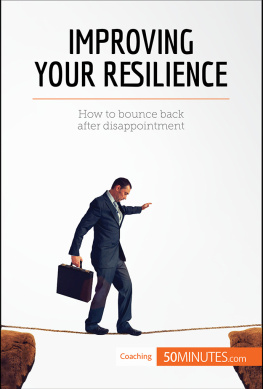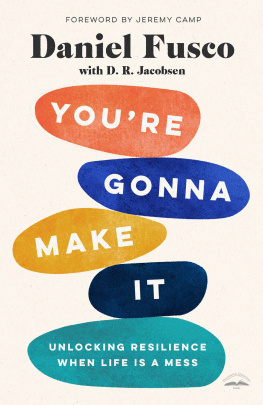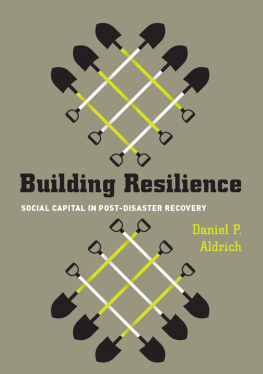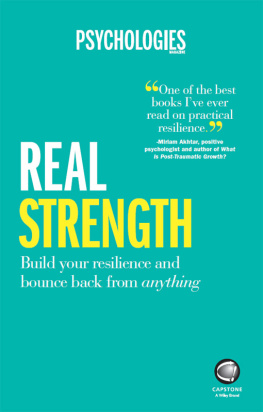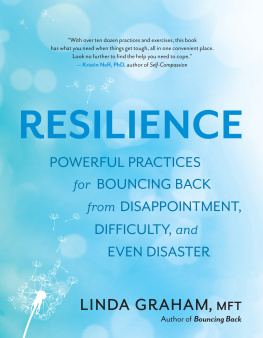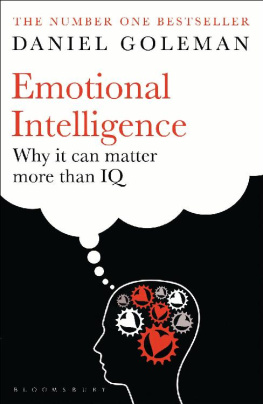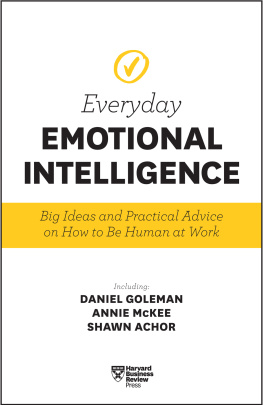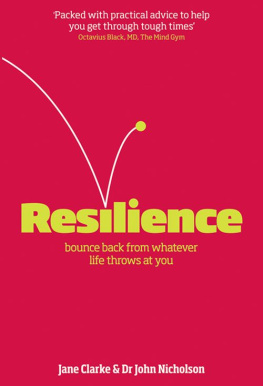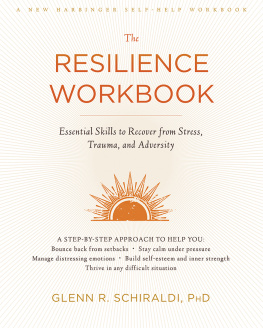Resilience
HBR EMOTIONAL INTELLIGENCE SERIES
HBR Emotional Intelligence Series
How to be human at work
The HBR Emotional Intelligence Series features smart, essential reading on the human side of professional life from the pages of Harvard Business Review.
Empathy
Happiness
Mindfulness
Resilience
Other books on emotional intelligence from Harvard Business Review:
HBRs 10 Must Reads on Emotional Intelligence
HBR Guide to Emotional Intelligence
Resilience
HBR EMOTIONAL INTELLIGENCE SERIES
Harvard Business Review Press
Boston, Massachusetts
HBR Press Quantity Sales Discounts
Harvard Business Review Press titles are available at significant quantity discounts when purchased in bulk for client gifts, sales promotions, and premiums. Special editions, including books with corporate logos, customized covers, and letters from the company printed in the front matter, as well as excerpts of existing books, can also be created in large quantities for special needs. For details and discount information for both print and ebook formats, contact .
Copyright 2017 Harvard Business School Publishing Corporation
All rights reserved
Printed in the United States of America
10 9 8 7 6 5 4 3 2 1
No part of this publication may be reproduced, stored in or introduced into a retrieval system, or transmitted, in any form, or by any means (electronic, mechanical, photocopying, recording, or otherwise), without the prior permission of the publisher. Requests for permission should be directed to , or mailed to Permissions, Harvard Business School Publishing, 60 Harvard Way, Boston, Massachusetts 02163.
The web addresses referenced in this book were live and correct at the time of the books publication but may be subject to change.
Library of Congress Cataloging-in-Publication Data
Title: Resilience.
Other titles: HBR emotional intelligence series.
Description: Boston, Massachusetts : Harvard Business Review Press, [2017] | Series: HBR emotional intelligence series
Identifiers: LCCN 2016056296 | ISBN 9781633693234 (pbk. : alk. paper)
Subjects: LCSH: Resilience (Personality trait) | Management.
Classification: LCC BF698.35.R47 R462 2017 | DDC 155.2/4dc23 LC record available at https://lccn.loc.gov/2016056296
ISBN: 978-1-63369-234-4
eISBN: 978-1-63369-324-1
The paper used in this publication meets the requirements of the American National Standard for Permanence of Paper for Publications and Documents in Libraries and Archives Z39.48-1992.
Contents
Three traits of those who bounce back.
By Diane Coutu
Train your brain.
By Daniel Goleman
A methodical approach.
By David Kopans
Turn tough feedback into growth.
By Sheila Heen and Douglas Stone
Manage big professional setbacks.
By Jeffrey A. Sonnenfeld and Andrew J. Ward
Its not about powering through.
By Shawn Achor and Michelle Gielan
Resilience
HBR EMOTIONAL INTELLIGENCE SERIES
1
How Resilience Works
By Diane Coutu
When I began my career in journalismI was a reporter at a national magazine in those daysthere was a man Ill call Claus Schmidt. He was in his mid-fifties, and to my impressionable eyes, he was the quintessential newsman: cynical at times, but unrelentingly curious and full of life, and often hilariously funny in a sandpaper-dry kind of way. He churned out hard-hitting cover stories and features with a speed and elegance I could only dream of. It always astounded me that he was never promoted to managing editor.
But people who knew Claus better than I did thought of him not just as a great newsman but as a quintessential survivor, someone who had endured in an environment often hostile to talent. He had lived through at least three major changes in the magazines leadership, losing most of his best friends and colleagues on the way. At home, two of his children succumbed to incurable illnesses, and a third was killed in a traffic accident. Despite all thisor maybe because of ithe milled around the newsroom day after day, mentoring the cub reporters, talking about the novels he was writingalways looking forward to what the future held for him.
Why do some people suffer real hardships and not falter? Claus Schmidt could have reacted very differently. Weve all seen that happen: One person cannot seem to get the confidence back after a layoff; another, persistently depressed, takes a few years off from life after her divorce. The question we would all like answered is, Why? What exactly is that quality of resilience that carries people through life?
Its a question that has fascinated me ever since I first learned of the Holocaust survivors in elementary school. In college, and later in my studies as an affiliate scholar at the Boston Psychoanalytic Society and Institute, I returned to the subject. For the past several months, however, I have looked on it with a new urgency, for it seems to me that the terrorism, war, and recession of recent months have made understanding resilience more important than ever. I have considered both the nature of individual resilience and what makes some organizations as a whole more resilient than others. Why do some people and some companies buckle under pressure? And what makes others bend and ultimately bounce back?
My exploration has taught me much about resilience, although its a subject none of us will ever under stand fully. Indeed, resilience is one of the great puzzles of human nature, like creativity or the religious instinct. But in sifting through psychological research and in reflecting on the many stories of resilience Ive heard, I have seen a little more deeply into the hearts and minds of people like Claus Schmidt and, in doing so, looked more deeply into the human psyche as well.
The buzz about resilience
Resilience is a hot topic in business these days. Not long ago, I was talking to a senior partner at a respected consulting firm about how to land the very best MBAsthe name of the game in that particular industry. The partner, Daniel Savageau (not his real name), ticked off a long list of qualities his firm sought in its hires: intelligence, ambition, integrity, analytic ability, and so on. What about resilience? I asked. Well, thats very popular right now, he said. Its the new buzzword. Candidates even tell us theyre resilient; they volunteer the information. But frankly, theyre just too young to know that about themselves. Resilience is something you realize you have after the fact.
But if you could, would you test for it? I asked. Does it matter in business?
Savageau paused. Hes a man in his late forties and a success personally and professionally. Yet it hadnt been a smooth ride to the top. Hed started his life as a poor French Canadian in Woonsocket, Rhode Island, and had lost his father at six. He lucked into a football scholarship but was kicked out of Boston University twice for drinking. He turned his life around in his twenties, married, divorced, remarried, and raised five children. Along the way, he made and lost two fortunes before helping to found the consulting firm he now runs. Yes, it does matter, he said at last. In fact, it probably matters more than any of the usual things we look for. In the course of reporting this article, I heard the same assertion time and again. As Dean Becker, the president and CEO of Adaptiv Learning Systems, a four-year-old company in King of Prussia, Pennsylvania, that develops and delivers programs about resilience training, puts it: More than education, more than experience, more than training, a persons level of resilience will determine who succeeds and who fails. Thats true in the cancer ward, its true in the Olympics, and its true in the boardroom.

